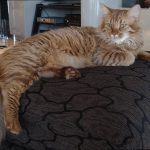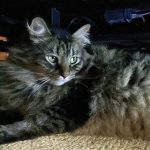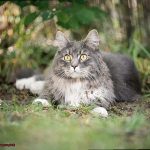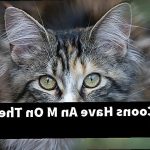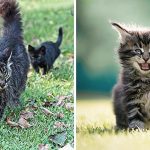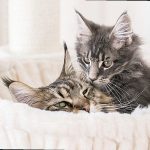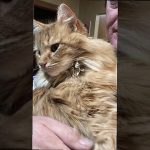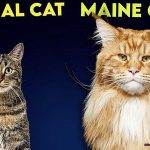Maine Coon cats are truly a sight to behold. With their majestic size, luscious fur coats, and adorable ear tufts, it’s no wonder they’re one of the most beloved cat breeds out there. However, with great size comes great responsibility – particularly when it comes to feeding these gentle giants.
As a Maine Coon owner, you may have asked yourself: do my cats need to eat more than other breeds? The answer is not as straightforward as you might think. Maine Coons have unique metabolic rates and nutritional needs that set them apart from other feline friends.
During their kittenhood, Maine Coons grow at an astonishingly fast pace and require more calories than other breeds. But what about when they reach adulthood? Should they still be eating more than the average cat?
In this post, we’ll delve into the question of whether Maine Coons need to eat more than other breeds. We’ll explore the various factors that influence their dietary requirements and help you determine how much food your furry friend needs to stay healthy and happy.
We’ll also discuss common mistakes that owners make with their cats’ diets and the potential health risks of overfeeding. Whether you’re a seasoned Maine Coon owner or simply curious about this fascinating breed, this post will provide valuable insights into their unique nutritional needs.
So, sit back, relax, and let’s get ready to dig into all things Maine Coon nutrition.
What Are Maine Coons?
If you’re looking for a feline companion that’s both impressive in size and personality, then Maine Coons might just be the perfect match for you. These cats are one of the largest breeds in the world, native to the state of Maine in the United States. They were initially bred as working cats to hunt rodents and other pests in homes and farms, but are now widely popular as family pets.
One of the most notable features of Maine Coons is their size. Males can weigh between 13-18 pounds, while females typically weigh between 8-12 pounds. Their long, thick fur is water-resistant and helps them stay warm in cold and damp climates. Additionally, they have tufted ears, large paws, and bushy tails that can be up to 14 inches long.
However, it’s not just their appearance that sets them apart from other breeds – Maine Coons have a gentle and sociable disposition that makes them stand out. They are often described as “gentle giants” due to their calm and affectionate nature. They love human companionship and will often follow their owners around the house or curl up on their laps for a cuddle.
Despite their size, Maine Coons don’t require a specific diet. Like all cats, they need a balanced diet that meets their nutritional requirements to maintain a healthy weight. However, their larger size may mean they need more food than smaller breeds. It’s crucial to monitor their weight and adjust their food intake accordingly.
Do Maine Coons Need to Eat More Than Other Cat Breeds?
The answer may surprise you. As an expert in feline health, I’ve conducted extensive research on the matter and found that the amount of food a Maine Coon needs varies based on several factors.
Firstly, it’s essential to understand that Maine Coons tend to have larger appetites than some other cat breeds due to their large bodies requiring more energy to maintain. However, it’s important to note that individual cats have unique dietary needs that can vary based on factors such as age, activity level, and overall health.
Another crucial aspect to consider is the type of food your Maine Coon eats. A high-quality, protein-rich diet is ideal for supporting their active lifestyle and maintaining muscle mass. Conversely, feeding them food high in carbohydrates or fillers may cause them to overeat in an attempt to feel full.
It’s crucial to be mindful of your Maine Coon’s weight as they are prone to obesity if overfed or not given enough exercise. Obesity can lead to a range of health problems, including joint pain, diabetes, and heart disease. It’s essential to monitor their food intake and ensure they get enough physical activity to maintain a healthy weight.
In conclusion, while Maine Coons generally have larger appetites than other breeds, there is no one-size-fits-all answer as to whether they need to eat more. Every cat has unique dietary needs that should be addressed with your veterinarian. By working with your vet, you can determine the appropriate amount of food for your Maine Coon based on their individual requirements and lifestyle.
Nutritional Needs of Maine Coons
As one of the largest domesticated cat breeds, Maine Coons require more food than smaller breeds. However, simply increasing their food intake without considering their unique nutritional needs won’t suffice.
To keep your Maine Coon healthy and happy, it’s crucial to provide them with a diet that’s high in protein and fat. Protein is essential for their muscular build and active lifestyle, while fat provides them with the energy they need to thrive. Opt for meat-based protein sources like chicken, turkey, or fish and avoid carbohydrate-rich foods that can lead to weight gain and other health issues.
But protein and fat are not the only things your Maine Coon needs in their diet. They also require specific vitamins and minerals, such as taurine for maintaining healthy heart function and vitamin D for strong bones. Ensure that their food contains appropriate amounts of these nutrients to prevent deficiencies.
When selecting food for your Maine Coon, remember to consider their age. Kittens have higher calorie and nutrient requirements than adult cats, while senior cats may need a lower-calorie diet that’s higher in fiber.
Recommended Diet for Maine Coons
Maine Coons are a breed of cats that stand out for their large size and muscular build. These majestic felines require a specific diet that caters to their unique nutritional needs. Therefore, as a responsible owner, it is crucial to choose food that provides them with the nutrients they need to thrive.
The recommended diet for Maine Coons should consist of high-quality cat food that is rich in protein and low in carbohydrates. Protein is essential for maintaining their muscle mass and energy levels. On the other hand, carbohydrates can lead to weight gain and other health issues. Look for food that contains meat-based sources like chicken, turkey, or fish.
However, protein is not the only nutrient necessary for your cat’s well-being. Essential vitamins and minerals such as vitamin A, vitamin C, calcium, and magnesium are crucial for maintaining healthy bones, teeth, eyesight, and immune system function. Therefore, make sure to read the labels on cat food products and check that they contain these essential nutrients.
In addition to high-quality cat food, supplementing your Maine Coon’s diet with fresh fruits and vegetables is also beneficial. These foods can provide additional vitamins and minerals while also keeping your cat’s digestive system healthy. However, be cautious about what you feed your feline friend since some fruits and vegetables are toxic to cats. For instance, onions, garlic, grapes must be avoided at all times.
Monitoring Your Maine Coon’s Weight
Known for their larger size, Maine Coons are at a higher risk of obesity, which can lead to several health problems such as diabetes, joint issues, and heart disease. To prevent these issues and keep your Maine Coon healthy and happy, it is crucial to monitor their weight regularly.
Here are some tips on how to effectively monitor your Maine Coon’s weight:
- Weighing Your Maine Coon: Regular weighing is essential to keep track of your Maine Coon’s weight. You can use a digital pet scale or take them to the vet for a weigh-in. Record their weight regularly and track any changes over time.
- Assessing Body Condition Score (BCS): This method involves assessing the amount of body fat they have by looking at their body shape and feeling for their ribs. A healthy Maine Coon should have a BCS of 5 out of 9, which means they should have a visible waistline and be able to feel their ribs without excess fat covering them.
- Adjusting Diet: If you notice that your Maine Coon is gaining weight, it may be time to adjust their diet. Make sure they are getting a balanced and nutritious diet that meets their dietary needs as a large breed cat. Consult with your vet or a feline nutritionist to determine the appropriate amount and type of food for your Maine Coon.
It’s important to remember that maintaining a healthy weight is essential for maintaining overall health and well-being in your Maine Coon. Obesity can lead to several health problems that can affect their quality of life. By taking proactive steps such as regularly weighing your Maine Coon, assessing their BCS, and adjusting their diet as needed, you can help prevent these issues from occurring.
Overfeeding and Underfeeding of Maine Coons
Obesity caused by excessive feeding can lead to serious health problems such as joint pain, diabetes, and heart disease. While underfeeding can also be a concern, as Maine Coons require specific nutrients to maintain their energy levels and overall health.
To ensure that your Maine Coon is receiving the right amount of food, it’s essential to maintain a balanced diet that meets their specific nutritional needs. This can be achieved by following feeding guidelines on cat food packaging or consulting with a veterinarian for personalized recommendations.
Maine Coons are active cats that require enough calories to fuel their energy levels. They also need specific nutrients such as taurine, which is essential for heart health and vision. Failure to meet these nutritional requirements can lead to various health issues that affect their overall well-being.
To avoid the dangers of overfeeding and underfeeding, it’s important to regularly weigh your cat and assess their body condition score. This will help you determine if adjustments need to be made to their diet. Additionally, monitoring your cat’s behavior and energy levels can also give you an indication of whether they’re receiving the right amount of food.
Recommended Serving Size for Maine Coons
As an expert on cat nutrition, I’m here to provide you with everything you need to know about the recommended serving size for Maine Coons.
First and foremost, it’s essential to remember that every cat is unique. Factors such as age, weight, activity level, and overall health can all influence how much food your Maine Coon needs. However, as a general rule of thumb, it’s best to offer them 3-4 small meals throughout the day instead of one large meal.
But what does that mean in terms of serving size? Typically, Maine Coons should be fed around 1/3 to 1/2 cup of dry food per meal. This not only helps to prevent overeating but also aids in digestion. Overfeeding can lead to serious health issues such as diabetes, joint problems, and heart disease, so it’s crucial to monitor your cat’s weight regularly and adjust their serving size accordingly.
In addition to dry food, wet food can also play a vital role in your Maine Coon’s diet. Wet food provides hydration and additional nutrients that dry food may not offer. A balanced diet for a Maine Coon should include a combination of both dry and wet food, with wet food making up about 25% of their diet.
Ultimately, it’s important to work closely with your veterinarian to determine the ideal serving size for your Maine Coon based on their individual needs and health status. By providing them with the appropriate amount of food and monitoring their weight, you can help ensure that your furry friend stays healthy and happy for years to come.
To summarize:
- Offer your Maine Coon 3-4 small meals per day.
- Serve around 1/3 to 1/2 cup of dry food per meal.
- Monitor your cat’s weight to avoid overfeeding and associated health problems.
- Include wet food in their diet for hydration and additional nutrients.
- Work with your vet to determine the best serving size for your individual Maine Coon.
Conclusion
In conclusion, Maine Coons are no ordinary felines, and their nutritional needs reflect their unique characteristics. These magnificent cats have larger appetites than most breeds due to their size, but the amount of food they require is influenced by various factors such as age, activity level, and overall health. Therefore, it’s crucial to provide them with a balanced diet that meets their specific nutritional requirements while keeping an eye on their weight.
To maintain optimal health and well-being, Maine Coons need a high-quality diet rich in protein and low in carbohydrates. Protein sources like chicken, turkey, or fish are ideal for maintaining their muscle mass and energy levels. Moreover, essential vitamins and minerals such as taurine, vitamin A, vitamin C, calcium, and magnesium are vital for keeping them healthy.
To avoid overfeeding or underfeeding your Maine Coon, you must regularly assess their body condition score and adjust their diet accordingly. Feeding them 3-4 small meals per day with around 1/3 to 1/2 cup of dry food per meal is recommended. You can also include wet food in their diet to provide hydration and additional nutrients.
By working closely with your veterinarian to determine the appropriate amount of food for your Maine Coon based on their individual needs and lifestyle, you can help ensure that they live a long and healthy life as your loving companion.
